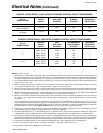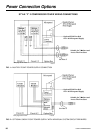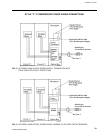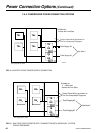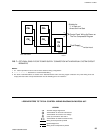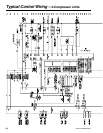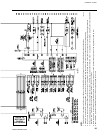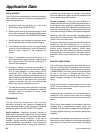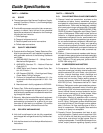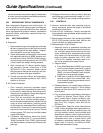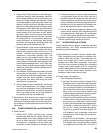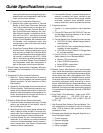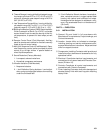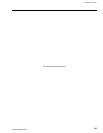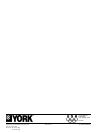
YORK INTERNATIONAL
98
Guide Specifications (Continued)
valve to command compressor capacity independent
of control valve input pressure and balance compres-
sor capacity with cooling load.
2.03 REFRIGERANT CIRCUIT COMPONENTS
Each independent refrigerant circuit shall include: liq-
uid line shutoff valve with charging port, low side pres-
sure relief device, removable core filter-drier, solenoid
valve, sight glass with moisture indicator, thermostatic
expansion valves, and flexible, closed-cell foam insu-
lated suction line.
2.04 HEAT EXCHANGERS
A. Evaporator:
1. Direct expansion type with refrigerant inside high
efficiency copper tubes, chilled liquid forced over
the tubes by galvanized steel baffles. Indepen-
dent refrigerant circuits per compressor.
2. Constructed, tested, and stamped in accordance
with applicable sections of ASME pressure ves-
sel code for minimum 350 PSIG (24 bar) refriger-
ant side design working pressure and 150 PSIG
(10 bar) water side design working pressure.
3. Shell covered with ¾" (19mm), flexible, closed-
cell insulation, thermal conductivity of 0.26k
([BTU/HR-Ft
2
-°F]/in.) maximum. Water nozzles
with grooves for mechanical couplings, and insu-
lated by Contractor after pipe installation.
4. Provide vent and drain fittings, and thermostati-
cally controlled heaters to protect to -20°F (-29°C)
ambient in off-cycle.
B. Air Cooled Condenser:
1. Coils: Internally enhanced, seamless copper
tubes, mechanically expanded into aluminum al-
loy fins with full height collars. Subcooling coil an
integral part of condenser. Design working pres-
sure shall be 450 PSIG (31 bar).
2. Fans: Shall be dynamically and statically bal-
anced, direct drive, corrosion resistant glass fi-
ber reinforced composite blades molded into low
noise, full airfoil cross section, providing vertical
air discharge from extended orifices for efficiency
and low sound. Each fan in its own compartment
to prevent cross flow during fan cycling. Guards
of heavy gauge, PVC (polyvinyl chloride) coated
or galvanized steel.
3. Fan Motors: High efficiency, direct drive, 6-pole,
3-phase, insulation class “F”, current protected,
Totally Enclosed Air-Over (TEAO), rigid mounted,
with double sealed, permanently lubricated, ball
bearings.
C. Refrigerant Economizer (when provided): Stainless
steel plate type, oven brazed with copper, U.L./cU.L.
Listed, 450 PSIG (31 bar) design working pressure.
2.05 CONTROLS
A. General: Automatic start, stop, operating, and pro-
tection sequences across the range of scheduled
conditions and transients.
B. Control Circuit Transformer: Factory mounted with
primary breaker having lockable, external handle, and
115V/1Ø secondary.
C. Microprocessor Enclosure: Rain and dust tight NEMA
3R/12 (IP55) powder painted steel cabinet with
hinged, latched, and gasket sealed door.
D. Microprocessor Control Center:
1. Automatic control of compressor start/stop and
load/unload, anti-coincidence and anti-recycle tim-
ers, automatic pump-down at start-up and shut-
down, condenser fans, evaporator pump, evapo-
rator heater, unit alarm contacts, run signal con-
tacts, and chiller operation from 0°F to 125°F
(-18°C to 52°) ambient. Automatic reset to nor-
mal chiller operation after power failure.
2. Setpoint Reset:
a. Pulse Width Modulated (PWM) input to reset
current unload setpoint downward via signal
from external Energy Management System
(EMS), maximum allowable reset program-
mable from microprocessor keypad.
b. PWM input to reset the chilled liquid setpoint
upward via signal from remote EMS, maxi-
mum allowable reset programmable from mi-
croprocessor keypad.
3. Software stored in non-volatile memory, with pro-
grammed setpoints retained in lithium battery
backed real time clock (RTC) memory for mini-
mum 5 years.
4. Forty character liquid crystal display, descriptions
in English (or Spanish, French, Italian, or Ger-
man), numeric data in English (or Metric) units.
Sealed keypad with sections for Setpoints, Dis-
play, Entry, Print, Program, Clock, and Unit On/
Off Switch.
5. Programmable Setpoints (within Manufacturer
limits): display language; discharge pressure un-
load and cutout; low suction pressure cutout; low
and high ambient cutouts; leaving chilled liquid
temperature: setpoint, control range, and cutout;
high motor current unload; anti-recycle time; lag
compressor start; local or remote control; units
of measure; compressor lead/lag; power failure
restart (auto or manual), and maximum EMS-
PWM reset temperature range.



